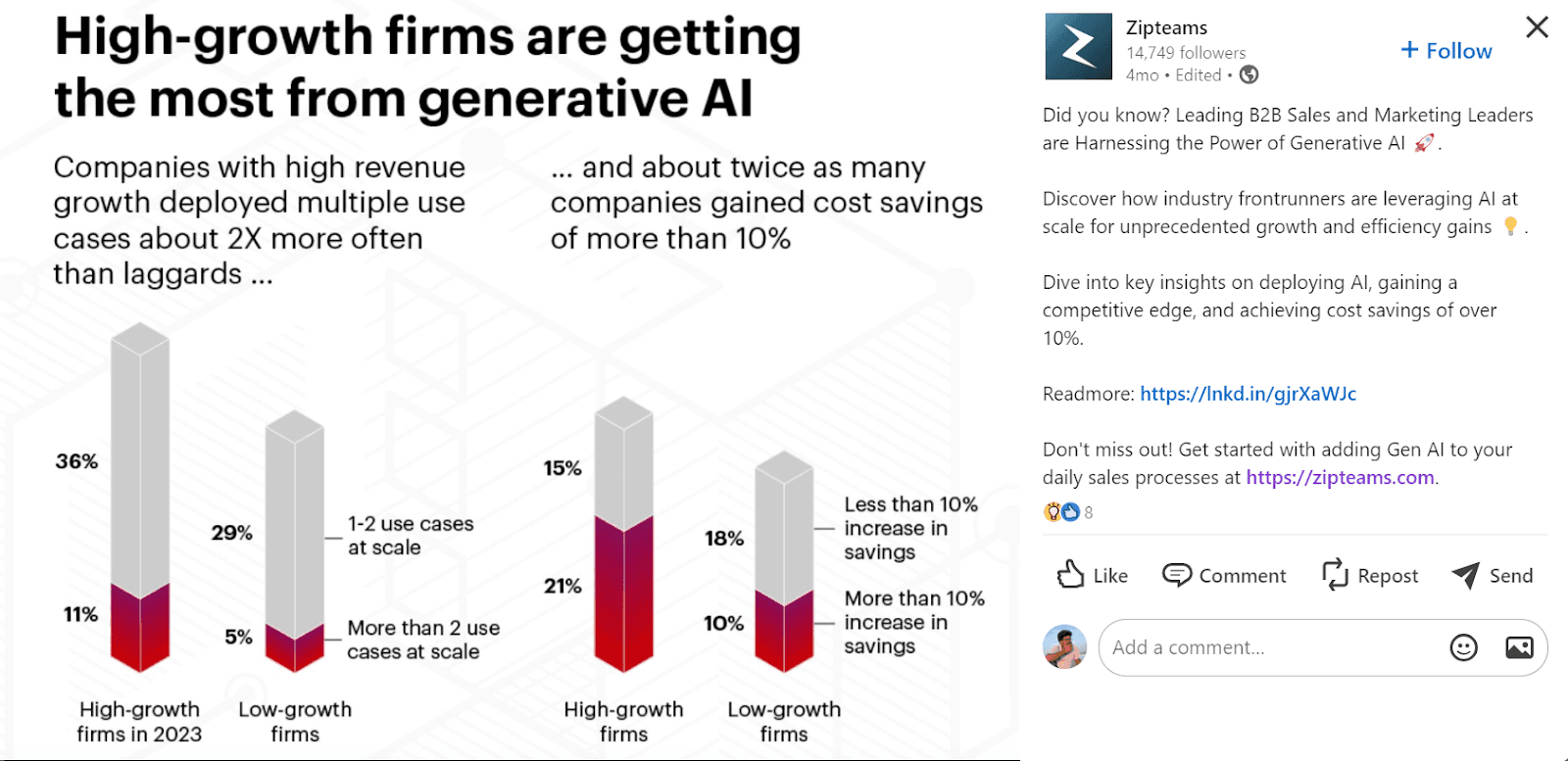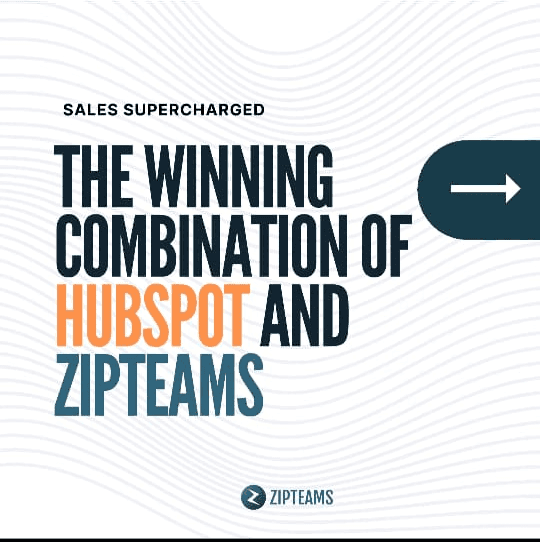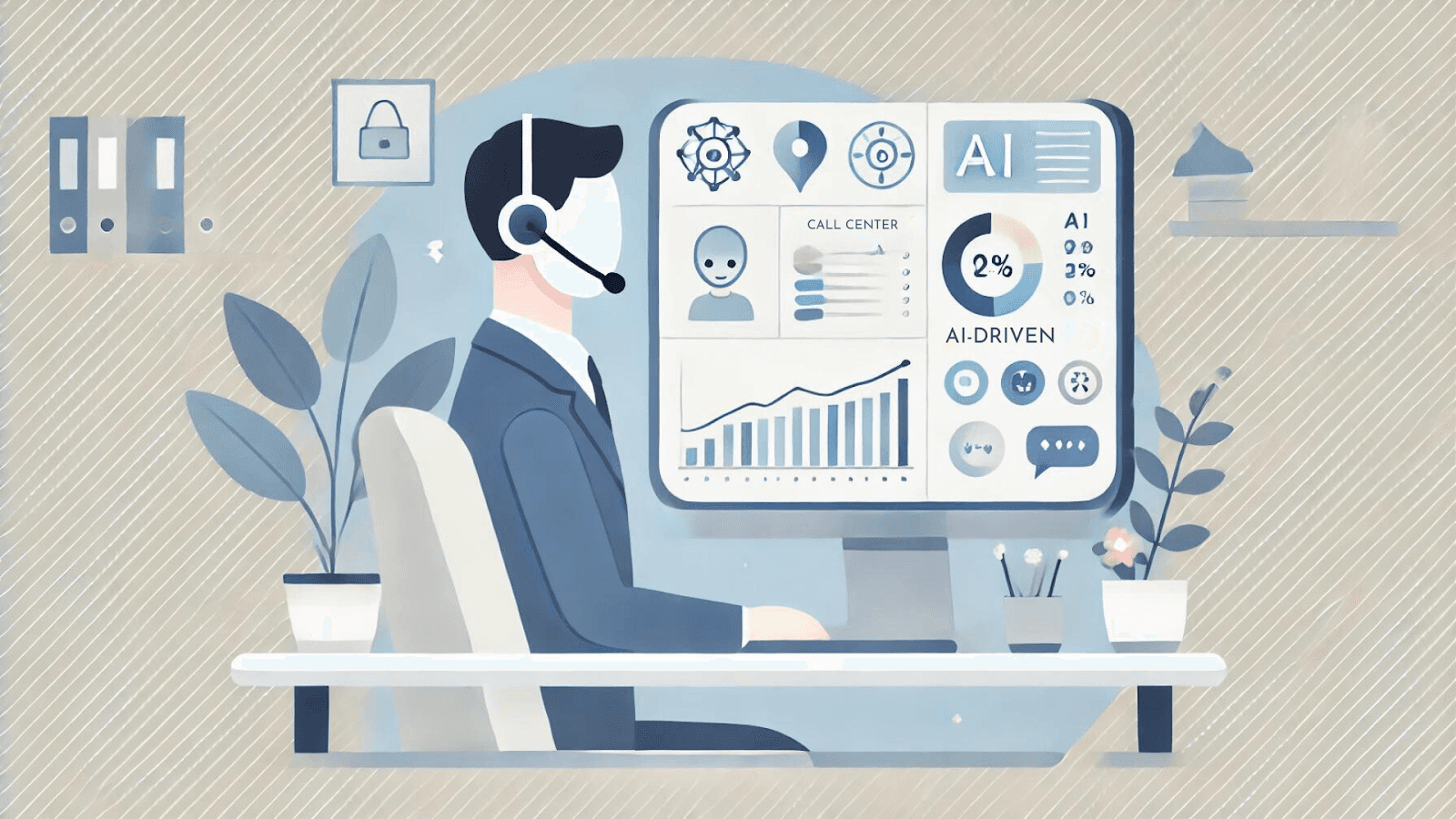How Generative AI Can Boost the Key Functions of CRM Systems for Maximising Revenue and Business Growth
Discover how generative AI enhances CRM systems to boost sales, marketing, and customer relations for increased revenue and efficiency.
Ramya S.
Oct 1, 2024
B2B Sales
Generative AI
CRM
Generative AI

Customer Relationship Management (CRM) systems have long been the backbone of businesses aiming to maintain strong and lasting customer relationships. In the long run, CRM functions included organising data, tracking interactions, and forecasting sales, but in today's fast-paced digital landscape, customer expectations have skyrocketed. In this fast-evolving digital landscape, businesses need more than just static tools—they need intelligence. Simply managing data isn't enough anymore. With trillions of data in the customer landscape, CRMs are struggling to interact within this data-driven world. The less the data is analysed, the less your team closes deals, as these massive data chains potentially hold unprecedented possibilities for customer interactions. Enter AI-powered CRMs, transforming CRM systems and its functions from static databases into dynamic tools that anticipate customer behaviour, personalise interactions, and automate essential tasks. Generative AI, in particular, is revolutionising functions of CRM by offering real-time insights, automating complex processes, and generating personalised interactions. As a result, businesses are equipped to engage customers better and increase revenue through more meaningful relationships.
What is Generative AI?
Generative AI is a cutting-edge branch of artificial intelligence that excels at creating new content, whether text, images, audio, or even video. Using deep learning algorithms, generative AI identifies patterns within existing data and uses that knowledge to produce original outputs that resemble human-created content. Unlike traditional AI models, which are typically rule-based, generative AI continuously learns from its inputs to become more efficient and creative.
Generative AI has many applications, transforming industries by enhancing creativity, efficiency, and automation. Here are some key applications across different sectors:
Healthcare: Generative AI assists in generating medical reports, designing personalised treatment plans, and even predicting patient outcomes based on historical data.
Media and Entertainment: Generative AI helps with scriptwriting, creating virtual environments, and producing music and art. In video games, AI can generate realistic environments and characters, significantly reducing the time and cost of production.
Retail and E-commerce: Retailers are utilising AI to generate personalised product recommendations, design tailored marketing campaigns, and even create product descriptions for large inventories.
Finance: In the financial sector, generative AI assists with fraud detection, risk modelling, and the automation of financial reports.
For businesses, generative AI tools integrated into CRMs enable a new level of customer engagement and operational efficiency. From basic data entry to complex sales training, Generative AI can effectively upskill the current business processes and operations.
Before heading to the super-powered world of Generative AI, let’s look at the key functions of a CRM in a business and How AI can potentially take charge of the CRMs.
What is a CRM and What Are Its Key Functions?
At their core, Customer Relations Management systems help businesses manage customer information and interactions to improve relationships, streamline processes, and increase profitability. In addition to these tasks, CRM functions also include:
Contact Management: Store and organise detailed customer information, including names, contact details, and past interactions, all in one place.
Sales Management: CRMs allow businesses to track leads, monitor sales pipelines, and manage sales activities efficiently.
Customer Service: Customer interactions are recorded, helping teams resolve issues quickly and improving customer satisfaction.
Marketing Automation: Many CRMs integrate marketing tools, helping businesses automate email campaigns, track customer engagement, and monitor conversion rates.
Data Analysis and Reporting: CRMs generate reports that allow businesses to analyse performance, sales trends, and customer data to make informed decisions.
While these functions provide immense value, they often require manual effort and struggle to meet the increasing demand for personalised, real-time customer engagement.
The Need for AI in Traditional CRM Systems
With an influx of customer data and the increasing demand for personalised service, businesses need more than basic organisational tools to stay competitive. Traditional CRMs, although powerful, often struggle to provide real-time insights needed to meet customer expectations. Here’s why combining AI with CRM is no longer just an option but a necessity:
Scalability: As customer data grows exponentially, AI helps manage and process large volumes of information faster than human teams can.
Personalisation: Customers expect tailored experiences. AI can analyse patterns and predict preferences, delivering hyper-personalised content and offers.
Efficiency: AI can automate repetitive tasks, such as data entry or lead scoring, freeing up time for teams to focus on high-value activities.
Predictive Insights: AI-driven CRMs offer predictive analytics that help businesses forecast sales trends and customer behavior more accurately.
Real-Time Decision Making: Speed is critical in the competitive landscape. AI allows businesses to respond to customer needs instantly with personalised recommendations or solutions.
Also read: The Power of Customer Data: Leveraging Insights to Drive Growth
The Impact of AI-Powered CRM on Sales and Customer Relations
AI-powered CRMs are revolutionising sales and customer relations by enhancing the customer experience and providing sales teams with actionable insights that drive revenue growth. Here’s how:
Enhanced Lead Scoring: AI can analyse past customer interactions, behaviors, and demographics to score leads more effectively. This ensures sales teams focus on high-potential prospects, increasing the likelihood of conversion.
Personalised Customer Engagement: By leveraging AI to track customer behavior in real-time, CRMs can automatically deliver personalised content, offers, and follow-up messages that resonate with individual customers.
Sales Forecasting and Strategy: AI-driven CRMs predict future sales trends by analysing patterns in customer buying behavior, helping businesses create more accurate sales forecasts and adjust strategies accordingly.
Streamlined Sales Processes: Routine tasks like updating customer data or scheduling follow-ups can be automated, allowing sales teams to dedicate more time to building relationships and closing deals.
Upselling and Cross-Selling: With AI analysing buying habits and preferences, CRMs can suggest relevant upselling or cross-selling opportunities, boosting revenue without pushing irrelevant products.

Check here to learn more about how leading firms are using Generative AI for business growth.
Real-World Use Cases of AI-Powered CRM in Business
Though AI-powered CRM can boost the overall operational efficiency of your venture, there are specific cases where AI can change the game if potentially customised to your best requirements. Let’s explore specific business functions where AI-powered CRMs are making a difference, from sales to marketing and customer relations:
Sales
AI tools in CRM systems can track leads, score them, and provide actionable insights on the best time to engage. AI-generated predictions on customer behavior allow sales teams to fine-tune their approach, increasing the chances of conversion. By automating lead follow-ups, AI-driven CRMs free sales teams to focus on closing deals and thus maximising ROI.
Customer Relationship Management
With AI, CRMs can personalise every touchpoint, from email communication to customer support interactions. AI chatbots, powered by generative models, engage with customers 24/7, answering queries and providing support in real-time. This not only enhances customer satisfaction but also frees up human resources for more complex interactions.
Marketing
AI helps CRM systems automate marketing campaigns by segmenting audiences based on customer preferences and behaviour. With AI, marketers can create hyper-targeted campaigns that resonate with specific customer segments, improving engagement and conversion rates.
Data Management
AI-powered CRMs can analyse vast datasets to unearth insights that would be difficult to discover manually. This enables businesses to make data-driven decisions and uncover trends that improve overall strategy, from customer engagement to product development.
Why Combine CRM and Generative AI?
Integrating Generative AI with your CRMs opens up many opportunities to stay on top of business. In addition to improving your customer engagements and boosting your sales funnel, Generative AI with a CRM can exclusively redefine your business. The following are exclusive advantages that only Generative AI can bring to your business.
Future-Proofing
With the current competitive ecosystem, Businesses must watch the changing market conditions and evolving customer demands. Generative AI, with its agile capabilities to read and analyse data, can predict variations and trends in the market. This prediction capacity is ever-evolving as the algorithm of Generative AI keeps learning from the business data. With predictive analytics of Generative AI, your business can stay agile and future-proof in any market.
Hyper-personalisation:
Customer retention is the paramount strategy for any business to stay ahead. Generative AI can redraw the landscape of customer loyalty by providing hyper-personalised interaction with the customer. With the historical and real-time data, your sales team can access comprehensive profiles of each customer to tailor the communication. The real-time data analysis of AI, from ongoing calls to website visits, has redefined the sales process into a precise and accurate cycle.
Choosing the Right Generative AI Tools
As businesses integrate AI into their CRM functions, choosing the right tool becomes crucial for maximising AI's potential. Selecting the ideal solution requires careful consideration of the tool's features and alignment with your business needs. Here are some major features to look for when choosing a generative AI tool for CRM:
Seamless Integration: The AI tool should easily integrate with your existing CRM and other business software, ensuring smooth data flow and minimal workflow disruption. Look for platforms that provide APIs and compatibility with popular CRMs like Salesforce or HubSpot. This allows businesses to quickly adapt AI capabilities without overhauling their entire system. For instance, Zipteams AI-powered tools can be integrated seamlessly with any popular CRM.
Customisability: Not all businesses operate the same way. A good AI tool should offer customisable solutions tailored to your business’s specific processes, workflows, and sales strategies. For instance, your AI might need to adapt lead-scoring models based on industry-specific criteria or customer behavior patterns.
Advanced Predictive Analytics: Predictive analytics is at the core of AI-powered CRM systems. A robust AI tool should analyse customer data to predict trends, customer needs, and buying behavior, enabling your business to anticipate demands and personalise engagements.
Real-Time Processing: Choose AI tools that can process data in real-time, allowing your teams to make quick, data-driven decisions. Real-time analytics provide instant insights, helping businesses react to customer behaviors or market shifts without delay.
Data Security and Compliance: Since CRM systems store vast amounts of sensitive customer data, AI tools must provide strong security features, including data encryption, secure data handling, and compliance with privacy regulations such as GDPR. This is essential to maintaining trust and avoiding legal repercussions.
Scalability: As your business grows, so will your customer data. The AI tool must scale alongside your CRM, handling increasing volumes of data while maintaining performance and efficiency.
Choosing a generative AI tool for CRM is not just about technology—it’s about finding a solution that aligns with your business needs. Ensuring the right mix of integration, customisation, and security will help you unlock the full potential of AI in your CRM system.

Check out now how Hubspot and Zipteams are changing the game of CRM.
Top 5 Leading AI Tools for CRMs
As Generative AI conquers the market, AI tools are captivating the CRM markets. These tools are available for various business operations. Here is a brief overview of five leading AI tools that captivate the current CRM Market.
1. Zipteams
Zipteams is a top AI-powered platform for business acceleration tools. In addition to AI powered applications for CRM, Zipteams features an exclusively designed conversational intelligence to analyse and convert your real-time business data. With Smart meeting rooms, the Zipteams AI tool can provide automated customer repositories customer engagements, and sentiment analysis.
Key features:
AI-powered lead tracking and conversion tools.
Acceleration of sales processes through real-time insights.
Automated workflows for enhanced customer engagement.
Seamless integrations with popular CRMs
2. Salesforce Einstein Salesforce Einstein offers powerful AI capabilities that are directly integrated into Salesforce CRM. It provides real-time predictive insights, allowing businesses to optimise lead scoring and automate customer interactions. Its deep learning models enable personalised engagement based on customer behavior.
3.HubSpot AI HubSpot's AI enhances CRM by focusing on personalised marketing automation, including smart email campaigns and customer segmentation. It supports lead nurturing by tracking user behavior and optimising workflows, making customer engagement more intuitive and data-driven.
4. Zoho Zia Zoho Zia acts as an intelligent AI assistant within Zoho CRM, providing actionable sales predictions, customer sentiment analysis, and workflow automation. Zia’s unique strength lies in its ability to detect patterns and offer real-time insights that enhance sales and service operations.
5. Microsoft Dynamics AI Microsoft Dynamics AI delivers customer insights through advanced machine learning models, assisting businesses in sales forecasting and personalised recommendations. The tool’s seamless integration with Microsoft products enhances productivity across various departments, from sales to customer support.
Conclusion
AI-powered CRMs are not just a trend but a transformative force in how businesses manage customer relationships and drive sales. By integrating generative AI, businesses can take their CRM systems to new heights—automating routine tasks, personalising customer experiences, and offering deeper insights into sales strategies. As businesses look to the future, AI tools in their CRMs will be best positioned to accelerate revenue growth and maintain long-lasting customer loyalty. With generative AI at the helm, the future of business is smarter, faster, and more intelligent. Ready for explosive growth. Tap into the booming AI tools to make wonders in your sales ventures.

